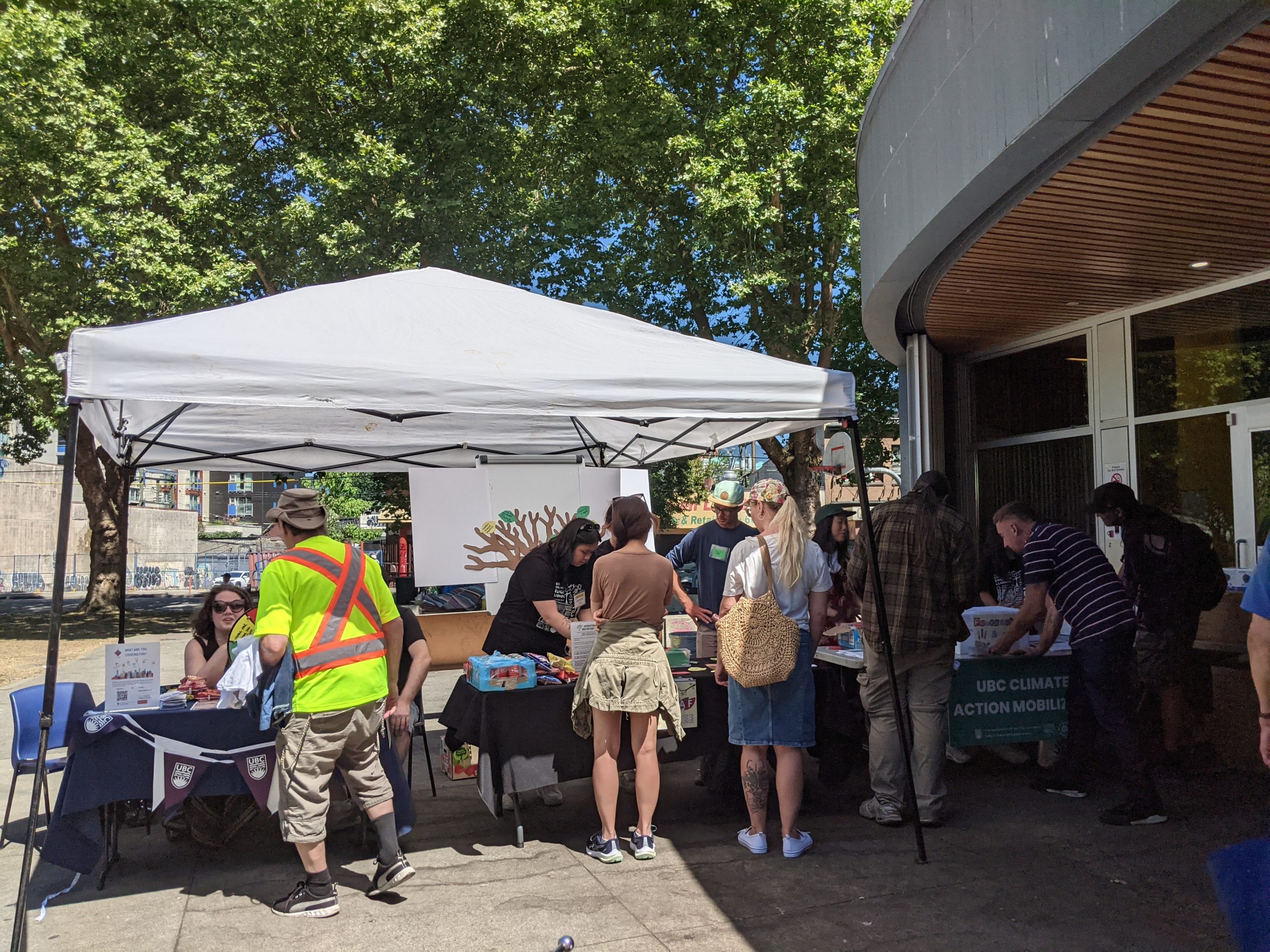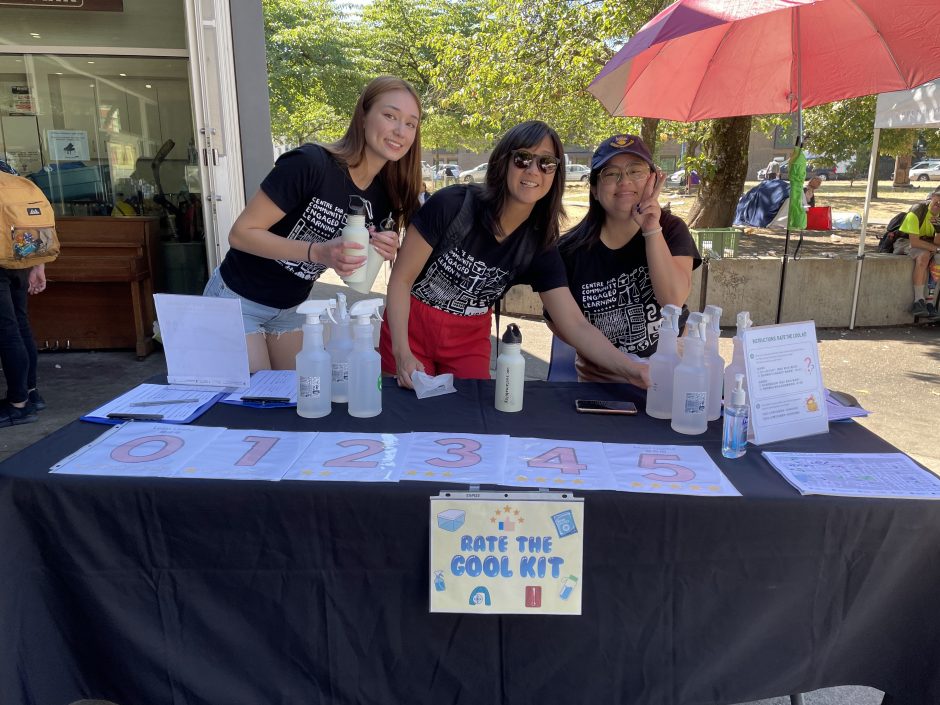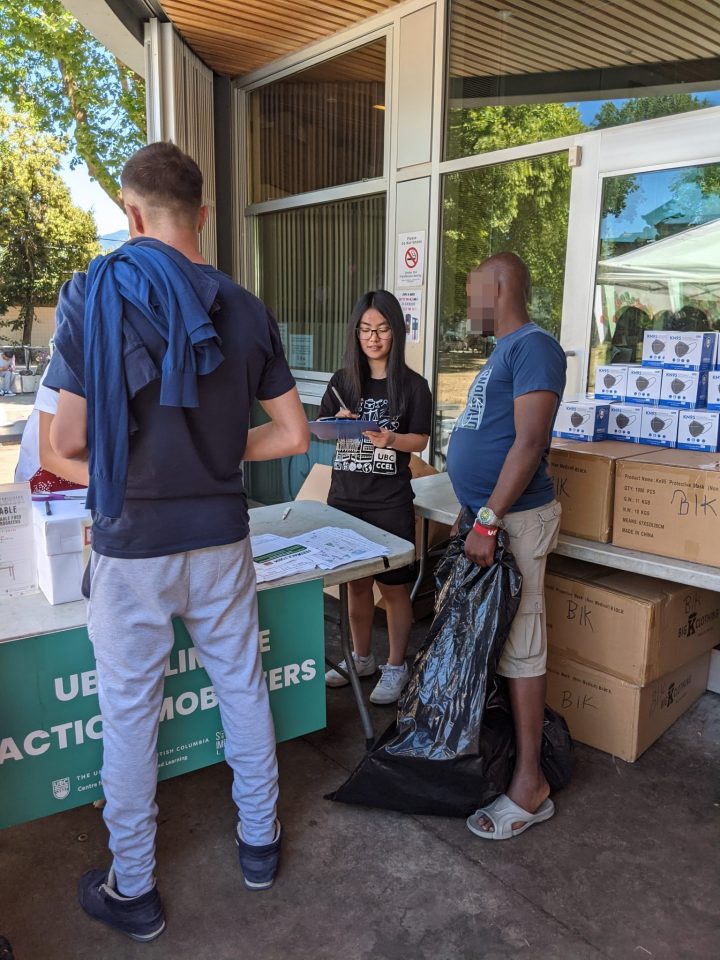
EVENT OVERVIEW

The UBC Climate Action Mobilizers (CAM) consulted with Vancouver’s Downtown Eastside (DTES) community to better understand how residents are impacted by climate change at the Oppenheimer Park Extreme Heat Pop-up event. This event supported the broader community consultation and capacity building goals of the CLEAR (Climate Equity Activation and Resilience) Project, a collective initiative led by the UBC Sustainability Hub, the UBC Learning Exchange, and four DTES community organizations, with the support of additional UBC partners such as the Centre for Community Engaged Learning (CCEL). Hosted by Working Gear, a non-profit organization in the DTES and a partner of the CLEAR Project, this event successfully engaged 240+ community residents.
In an effort to surface DTES community assets, challenges, and needs in relation to extreme heat events, the CAM team created four interactive stations. The first station focused on: how the DTES community stays cool; what actions residents take to help their neighbours during extreme heat; and what resources and supports they need more of. At the second station, residents were asked to rate the effectiveness of items in a Cool Kit. These kits have been distributed by the City of Vancouver and Vancouver Coastal Health to community members who are at risk of heat-related illnesses. The third station focused on learning how relevant community residents perceive climate change to be as an issue. The fourth station gathered feedback from residents on how the City of Vancouver can support the DTES community during extreme heat events.


EVENT OUTCOMES
To meet the community’s Chinese language needs, the CAM team provided Chinese translations for the activity station instructions, as well as Mandarin and Cantonese language support at the event. The CAM team also provided support to Spanish and Persian language speakers using translation applications.
Station 1: Heat Re-leaf Tree
Participants: 95 community members including 4 Mandarin, 8 Cantonese, 3 Spanish, and 1 Persian language speakers.
The CAM team consulted with the DTES community about their extreme heat coping needs through a series of three questions. Residents were asked to write answers to three questions on colour coded leaves. The leaves were then placed on a tree to help visually communicate the community’s collective experiences and needs. The following are the questions and response categories. Participants shared one or various ways they address each question.
What do you do to stay cool?
- 44% seek shaded areas
- 41% use cooling resources i.e., air conditioning, fans
- 32% drink water
- 26% engage in cooling activities i.e., swimming, cool bath
What do you do to support neighbours and those that you care about?
- 44% participate in community cooling activities
- 34% gather with others
- 26% provide cooling resources
What do you wish you had more of to stay cool?
- 58% existence of/access to public cooling areas
- 55% access to cooling resources
Station 2: Rate the Cool Kit
Participants: 66 community members including 2 Mandarin, 9 Cantonese, 5 Spanish, and 5 Persian language speakers.
In the effort to understand what heat relief items DTES community would find useful, the CAM team consulted community members on the usefulness of six items in a Cool Kit. The kit was created by the City of Vancouver and Vancouver Coastal Health and distributed to those who are at risk of heat-related illnesses in 2022. Participants rated a plastic tote, wall thermometer, gel pack, spray bottle, water bottle, and cooling towel on a scale of 0-5, with 0 being least useful and 5 most useful, and with the option of more than 1 item for each rating. They were also asked to share what they felt was the most and least useful and why.
Most useful
- 42% water bottle
- 27% wall thermometer
- 15% Cooling towel
- 12% Gel packs
- 10% Plastic tote
- 2% Spray bottle
Least useful
- 31% Plastic tote
- 31% Spray bottle
- 27% Gel packs
- 21% Wall thermometer
- 21% Cooling towel
- 8% Water bottle
Station 3: Drop the Bead
Participants: 79 community members including 11 Chinese, and 2 Vietnamese language speakers.
To better understand if and what climate change topics were being discussed in the DTES, residents were asked whether community members were talking about climate change. Participants indicated their answer by dropping a bead into the related jar. This interaction contributed to the visual representation of the community’s perspective. The CAM team followed up by asking what topics were being discussed.
Are people in your community talking about climate change?
- 62% yes
- 35% no
- 3% unsure
What do you hear people saying about climate change?
- 62% effects of climate change, environmental (49%) and social (13%)
- 21% causes of climate change, human (17%) and natural (4%)
- 11% climate action
- Other topics included climate reality; more pressing social concerns; politics; lack of awareness; lack of cooling supports; need for mitigation and adaptation; and seniors
Station 4: Feedback & Freezies
Participants: 96 community members including 6 Mandarin, 8 Cantonese, and 6 Spanish language speakers.
The CAM team consulted with community members on how they feel the City of Vancouver could support the DTES neighbourhood during extreme heat. To further understand how community members prefer to be engaged, participants were also asked if they felt the overall initiative was a good way to consult with the community.
How can the City of Vancouver support the Downtown Eastside community during extreme heat?
- An overwhelming majority of 81% reported that the government could support the DTES community by providing cooling supports
- Other forms of support mentioned included housing (7%), medical (6%), accessibility (6%), showing a sense of community (6%), financial (5%), education (5%), policy change (4%), caring for community (4%), substance use (3%), and refugee (1%)
Was this event a good way to consult with community?
- 96% yes
- 4% unsure